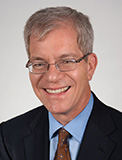How to Find the Next Bill Burns
President's Views
BY ROBERT J. SILVERMAN

Colleagues, I want to share with you the meat of a memo I sent to the participants in the Secretary’s senior retreat held on March 11. It previews a specific proposal that AFSA made to the Director General to revise the Schedule B hiring authority and cap the number of political appointee deputy assistant secretaries.
Over the past months, several of you have raised with me the question of how to identify the next Bill Burns, the next Foreign Service leader.
Finding the next Bill Burns is more akin to farming than hunting. It is not about spotting and bagging the single most-talented person in the bureaucracy.
It is about cultivating and preserving a personnel system that allows talented career people like Bill to rise up. It is about trusting the department’s ethos of selecting career employees for the great majority of mid-level manager DAS and most senior leadership assistant secretary and under secretary positions.
Underpinning that ethos is a belief that career employees bring the field experience and perspective critical to crafting and implementing our policies.
This system is in need of the kind of urgent repair that should be doable in the last two years of an administration. Little by little, position by position, career talent is being marginalized, and it doesn’t take long before a lack of opportunity for advancement leads to a self-fulfilling lack of available career talent.
Let’s stay with Bill Burns, and consider two of his positions that led to wider responsibilities. From 1988 to 1991, Bill served as the principal deputy director of the Secretary’s policy planning staff, his first major policy job. That position long ago shifted to political appointees. From 2005 to 2008, Bill served as ambassador to Moscow before returning to Washington as under secretary for political affairs. In the last five years, that job has gone, first, to a political appointee and then to a retired FSO.
Now there are other ways for career employees to move up other than Bill’s specific path. Probably there are understandable reasons why each of these jobs was taken out of the Foreign Service. But the cumulative effect of removing these and many other positions from the bidding pool is a failure to cultivate the Foreign Service talent system.
I ask your help in prioritizing the advancement of career FSOs because preserving that system is, in my view, best for our country’s foreign policy interests.
What is to be done? I suggest two things, one easy and the other harder.
The easier part is to focus on ambassadorships. U.S. law states that they should normally be accorded to Foreign Service members. We should continue to push, through the Deputies Committee and other means, for strong career candidates for each and every one of the remaining ambassadorships in this administration.
AFSA’s concern with ambassadorships is not solely about the number of career versus political appointments. It is also about keeping those with high policy relevance from going political. Focusing on ambassadors is relatively easy because, in the end, nominating them is the president’s prerogative, and all we can do is try our best.
The harder part is to focus on senior positions in the department. I suggest as a pragmatic matter focusing on those hired under Schedule B authority. Schedule Bs were originally intended as subject matter experts and technical advisers needed for non-recurring limited-term purposes. These hires are within the sole purview of the State Department.
I suggest two measures. First, let’s return Schedule B hiring to its original purpose of technical experts needed for one-off assignments.
Second, let’s allow no exceptions to the existing guidance that Schedule Bs not supervise career staff. And let’s cap the overall number of political-appointee DASs of any kind.
I ask for your support to allow the Director General to undertake this hard work of limiting Schedule B hires and capping political DASs. If we can agree on this measure, we will have taken an important step to ensure our country will have more career officials like Bill Burns at the top in the future.
Be well, stay safe and keep in touch,
Read More...
- A Life of Significance: An Interview with Deputy Secretary of State William J. Burns (The Foreign Service Journal, Nov. 2014)
- Bill Burns, a ‘diplomat’s diplomat,’ retires (The Washington Post, April 11, 2014)
- The White House’s Secret Diplomatic Weapon (The Atlantic, April 4, 2013)
- You Can’t Bomb It Away: The State Department’s former No. 2 on Iran’s nuclear program, Putin and past secretaries of state (Politico Magazine, March 15, 2015)
- Career Diplomats Worried About Influx of Political Appointees at State Department (ABC News, Oct. 31, 2014)
- White House and State Department Square Off Over Top Diplomatic Post (Foreign Policy, Oct. 16, 2014)

